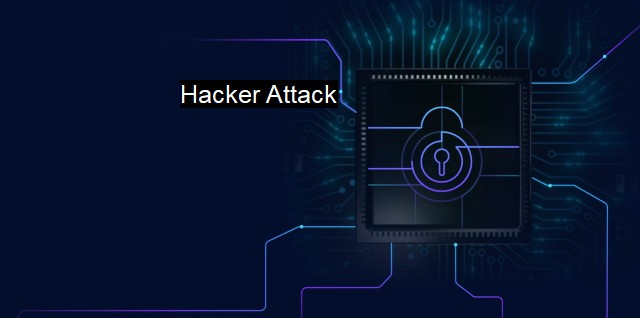What is Hacker Attack?
The Importance of Cybersecurity: Protecting Against Hacker Attacks and Malware
Understanding the complexities of the digital landscape is essential in this age of phenomenal technological advancement, especially in relation to the spectrum of cyber threats that exist, the most menacing among them being a hacker attack. The term carries a heavy weight and its essence becomes clearer when expanded within the context of cybersecurity and antivirus mechanisms.A hacker attack, as defined by cybersecurity experts, is an unauthorized intrusion into a computer or a network. The attackers, also known as hackers, employ various methods to alter the system's features, functioning, or even to pilfer sensitive information. The impetus behind such an invasion could range from malicious intent to curiosity or even competitive strategy in business by gaining access to competition's top secret information.
With the ever complex internet infrastructure of today’s world, hacker attacks are not solely restricted to computers. Mobile devices, network routers, and even the Internet of Things (IoT) devices like smart refrigerators or security cameras, are all susceptible to hacker attacks. The types of hacker attacks are highly diversified, catering to this expanded arena of vulnerability. Cyberattacks may include password cracking, where a hacker tries to decode your password by means of brute force or algorithmic logic; phishing, where scammers trick users into sharing sensitive data by pretending to represent legitimate organizations; ransomware attack, where a hacker encrypts users’ data and demands a ransom for its decryption; and DNS tunneling, where hackers convey malicious data over DNS protocols, enabling a covert communication channel.
Understanding such threats, cybersecurity becomes crucial as the first line of defense. It pertains to the practices and solutions designed to protect digital devices, networks, and data from different types of hacker attacks. The cybersecurity landscape offers a vast array of strategies and tools. Firewalls create a barrier between trusted and untrusted networks, monitoring and controlling incoming and outgoing network traffic based on predetermined security rules. Intrusion Detection Systems (IDS) analyze the network for potential threats and produce alerts when a threat is detected.
At another level, there is antivirus software, which is one of the commonly used tools to safeguard digital data and resources. They combat multiple forms of malware including viruses, worms, adware, and spyware, using a combination of methods such as signature-based detection, where they look for known malware, and heuristic-based detection, where they identify new malware or variants of known malware.
Despite these defenses, no system is completely immune from hacker attacks. This may be due to outdated antivirus software, ignored security updates, or even intricately designed malware that can evade security parameters. Owing to this, the cybersecurity sphere is in a constant state of evolution aligning their strategies and methods to counteract these sophisticated of hacker attacks.
To make matters complicated, ethical hacking exists, which presents a unique conundrum. Ethical hackers, sometimes called white-hat hackers, carry out planned attacks on systems or networks with the sole aim of exposing potential vulnerabilities, and then assist in strengthening the said systems or networks. They provide an invaluable service in fortifying organizational defense mechanisms.
Understanding hacker attacks, the preventative mechanisms, and the evolving landscape of cybersecurity is quintessential, given the digital-driven lives led by individuals and organizations today. Everyone is a potential target for hackers, which makes embracing good cybersecurity practices and regularly updating antivirus software of paramount importance in navigating the digital world. The nuanced understanding aids in illuminifying one's grasp of the digital realm, reducing susceptibility to attacks, and fostering an informed approach towards data security and privacy, epitomizing the adage 'Forewarned is forearmed'.

Hacker Attack FAQs
What is a hacker attack?
A hacker attack is an attempt by a third party to gain unauthorized access to a computer system or network with the intention of causing harm or stealing information.How can I protect my computer system from a hacker attack?
There are several measures you can take to protect your computer system from a hacker attack, including installing a reliable antivirus program, keeping your software up-to-date, using strong passwords, and avoiding suspicious emails and websites.What should I do if I suspect a hacker attack on my computer system?
If you suspect a hacker attack on your computer system, you should disconnect your device from the internet and run a full virus scan with your antivirus program. You should also change all your passwords and notify your IT department immediately if you are in a work setting.What are some common signs of a hacker attack?
Some common signs of a hacker attack include slow or unresponsive system performance, ransomware messages, unauthorized changes to files or settings, and unexpected pop-ups or alerts. If you notice any of these signs, you should take immediate action to protect your computer system.| | A | | | B | | | C | | | D | | | E | | | F | | | G | | | H | | | I | | | J | | | K | | | L | | | M | |
| | N | | | O | | | P | | | Q | | | R | | | S | | | T | | | U | | | V | | | W | | | X | | | Y | | | Z | |
| | 1 | | | 2 | | | 3 | | | 4 | | | 7 | | | 8 | | |||||||